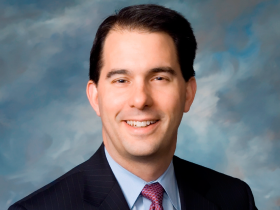Will Walker Veto Bill on Schools Using Indian Names?
He offers sympathy to both sides while reiterating his goal for job growth.
Gov. Scott Walker is still deliberating whether to veto a controversial bill that would make it harder to force schools to drop Indian names and mascots.
“It’s a tough balance,” Walker told the Wisconsin Center for Investigative Journalism in an interview Tuesday. While he empathizes with tribal leaders who oppose the bill, he is concerned about protecting free speech.
“Should government be able to eliminate free speech, even if it is a matter of saying what they want their mascot to be, or their nickname to be, at their school?” Walker asked.
Walker has until Thursday to sign or veto the bill; otherwise, it will automatically become law.
The governor, speaking at the Executive Residence as part of a traditional year-end round of interviews with state media, expressed his discomfort with the use of Indian names and mascots.
Full interview: Gov. Scott Walker, Dec. 17, 2013 from WisconsinWatch on Vimeo.
“If it were up to me personally,” Walker said, “I would find a way to find a more viable alternative to the name or the mascot or the nickname the school had.” He added, “With or without the law, I think schools need to be more sensitive.”
Sen. Lena Taylor, D-Milwaukee, an outspoken opponent of the bill, said it was incumbent on the governor to act on behalf of Native Americans, a minority group that lacks representation in the Legislature.
“Is it not up to him? Is he not the governor?” Taylor asked. “He leads. He takes us forward — or backward.”
The bill makes a number of changes to the process of objecting to a school district’s use of any “race-based nickname, logo, mascot, or team name,” including the need to collect signatures equal to 10 percent of the district’s student population.
It has drawn opposition from state tribes and the Wisconsin Council of Churches.
In the brief but wide-ranging interview, Walker also reiterated his commitment to creating 250,000 new private sector jobs by the end of his term. According to PolitiFact Wisconsin, fewer than 100,000 new jobs have been created to date, with just over a year left to go.
“I still have it as a goal,” he said. “But I don’t think it’s a magic number.” In fact, “I would love for it to be well over 250,000.”
“I’m really trying to focus on … helping the people of the state create 250,000 jobs,” he said.
In addition, Walker portrayed his handling of health care insurance as an attempt to help as many vulnerable residents as possible.
In November, he delayed the timeline for transitioning about 77,000 Wisconsin residents off Medicaid and onto the private health care exchanges, saying the federal government had botched implementation of the Affordable Care Act, or Obamacare. The state’s new transition date is April 1.
Walker said that if the system is not working adequately by then, “I think there will be changes in Washington” to the law. “Because if it is not working here it will not be working just about anywhere else in the country.”
Ultimately, though, Walker believes there will be a process in place to allow people to get coverage in the marketplace. He suggested this might include letting individuals participate in health plans outside of the exchange.
“In the end, as much as I politically didn’t like Obamacare,” Walker said, “I still want people not to fall through the cracks.”
The nonprofit Wisconsin Center for Investigative Journalism (www.WisconsinWatch.org) collaborates with Wisconsin Public Radio, Wisconsin Public Television, other news media and the UW-Madison School of Journalism and Mass Communication.
All works created, published, posted or disseminated by the Center do not necessarily reflect the views or opinions of UW-Madison or any of its affiliates.






















